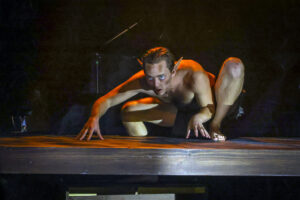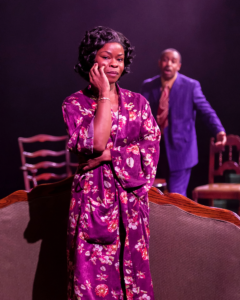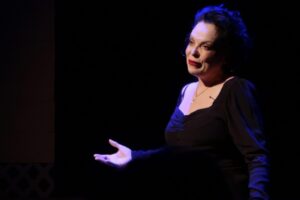5 MINUTES WITH ZADIE IFE

 ZADIA IFE, is a producer, director, writer, actress and educator. She is a graduate of Mason Gross School of Performing Arts at Rutgers University where she studied with Avery Brooks and Glenda Dickerson. Graduate studies were undertaken at Cornel University in African American Studies where she studied with Henry Louis Gates and Yosef ben Johanan. After leaving Cornel she took her doctoral courses also in African American Studies at Temple University where she served as Teaching Assistant to Pulitzer Prize winning playwright, Charles Fuller. She has taught courses in Theater, English and African American Studies at Temple, Lehigh University, Ramapo College, Freedom Theater, The Christina Cultural Arts Center and the University of Delaware.
ZADIA IFE, is a producer, director, writer, actress and educator. She is a graduate of Mason Gross School of Performing Arts at Rutgers University where she studied with Avery Brooks and Glenda Dickerson. Graduate studies were undertaken at Cornel University in African American Studies where she studied with Henry Louis Gates and Yosef ben Johanan. After leaving Cornel she took her doctoral courses also in African American Studies at Temple University where she served as Teaching Assistant to Pulitzer Prize winning playwright, Charles Fuller. She has taught courses in Theater, English and African American Studies at Temple, Lehigh University, Ramapo College, Freedom Theater, The Christina Cultural Arts Center and the University of Delaware.
Recent directing credits include: Three Times a Lady, by Dr. Gloria Morrow, the off-Broadway production of Ciao Bella by Karen Abercrombie, A Mile In My Shoes by Kathryn Taylor Smith, Story Book: The Seduction of Eve, (a short film) by Bobby Crear and Zadia Ife, the national tours of Love Jones the Musical and Thugs and the Women Who Love Them as well The Neighborhood Barbershop; by Thomas Wright. Most recently, she directed Detours by Gloria Morrow and Unsung Sheroes by Erika Cohen. The latter premiered at the (virtual) 2020 Atlanta Black Theater Festival.
How did you hear about this play ?
I’ve directed two other shows for the producer over the past 20 years. I did “Shakin’ the Mess Outta Misery” by Shay Youngblood in 2000 and “I Ain’t Yo’ Uncle” by Robert Alexander in 2003. The producer, Harry Jones, called several times about this piece; however, I was in NYC directing Kathryn Taylor Smith’s solo show “A Mile In My Shoes” at the United Solo Theater Festival at Theater Row. I returned his many phone calls when I got back to LA and he brought me a copy of the script. He told me that he had reached out to other directors but they turned him down. According to him, they felt that “not enough was going in the piece.” I had the opposite reaction when I read it. I fell in love with the piece and knew that I could sink my creative energies into it.
What made you decide to direct the show?
After reading the play, I thought back to an article written on August 8, 2021, in the Washington Post. It stated that there have been at least eight suspected lynchings of African American men and teenagers in Mississippi since 2000. My graduate degrees are in African American Studies. As a person of African descent, as well as one who has thoroughly studied said history and culture, I was immediately alarmed and concerned after reading the article. To think that this type of mindless hatred is still going on in America – the land of the free…was unconscionable to say the least. Though the play entails an incident that happened during the Civil Rights Movement of the 1960’s, the article showed that racism is still alive and well in America in this day and age. For me it signaled the perfect time to mount the show. Sometimes we need a reminder of how far we have drifted from those iconic words…”…We hold these truths to be self-evident, that all men are created equal…”
What is your process in directing? Meaning, do you have a vision on how it should look and sound?
My process in directing starts with the script. I usually read it three times. The first time is to understand the story, emotional story, characters and plot. The second reading is usually when I start to visualize what the set could possibly be throughout each scene. The third time is when I focus on the transitions between each scene. At this point I get a sense of what the music and or sound effects should be from pre-show, through the play (including the curtain call) and post-show. I added some things for this production. For example, “Strange Fruit” is not in the script. However, as soon as I got to the end of Act I (when I was reading) I immediately heard Billie’s Holiday’s version of the song in my head. I knew that I wanted to include it. In order to make it work, I needed to cast an actress/dancer and an actress/singer.
How did you get into directing?
I got into directing when I was in college. My primary mentors were Avery Brooks and the late Glenda Dickerson. The latter taught me about blocking, staging and the flow that should happen as actors move around the stage. She also had a penchant for symbolism in her work. I often include that in mine. For example, the sound effect of the clock ticking at the end of Dolly’s monologue as we see her emotionally unraveling; teasing her hair and putting on lipstick, symbolizes the countdown to her mental deterioration and impending suicide.
What did you learn in school that you still practice today?
Avery Brooks used to say that the work was first and foremost of importance. He stressed that we should never ever disrespect or disregard it. The poem, the play, the song, dance, film, etc.; will outlive all of us once we’re dead and gone. Shakespeare died 400 years ago however his work lives on and is still being produced by countless individuals. Lorraine Hansberry left this physical plane in 1965. However, her seminal work “A Raisin in the Sun” continues to be produced. It was even turned into a musical. The work will always remain. Each generation will transform, transmute and synthesize it according to the creative energies that flow through their beings. I approach each project with this thought in mind.




